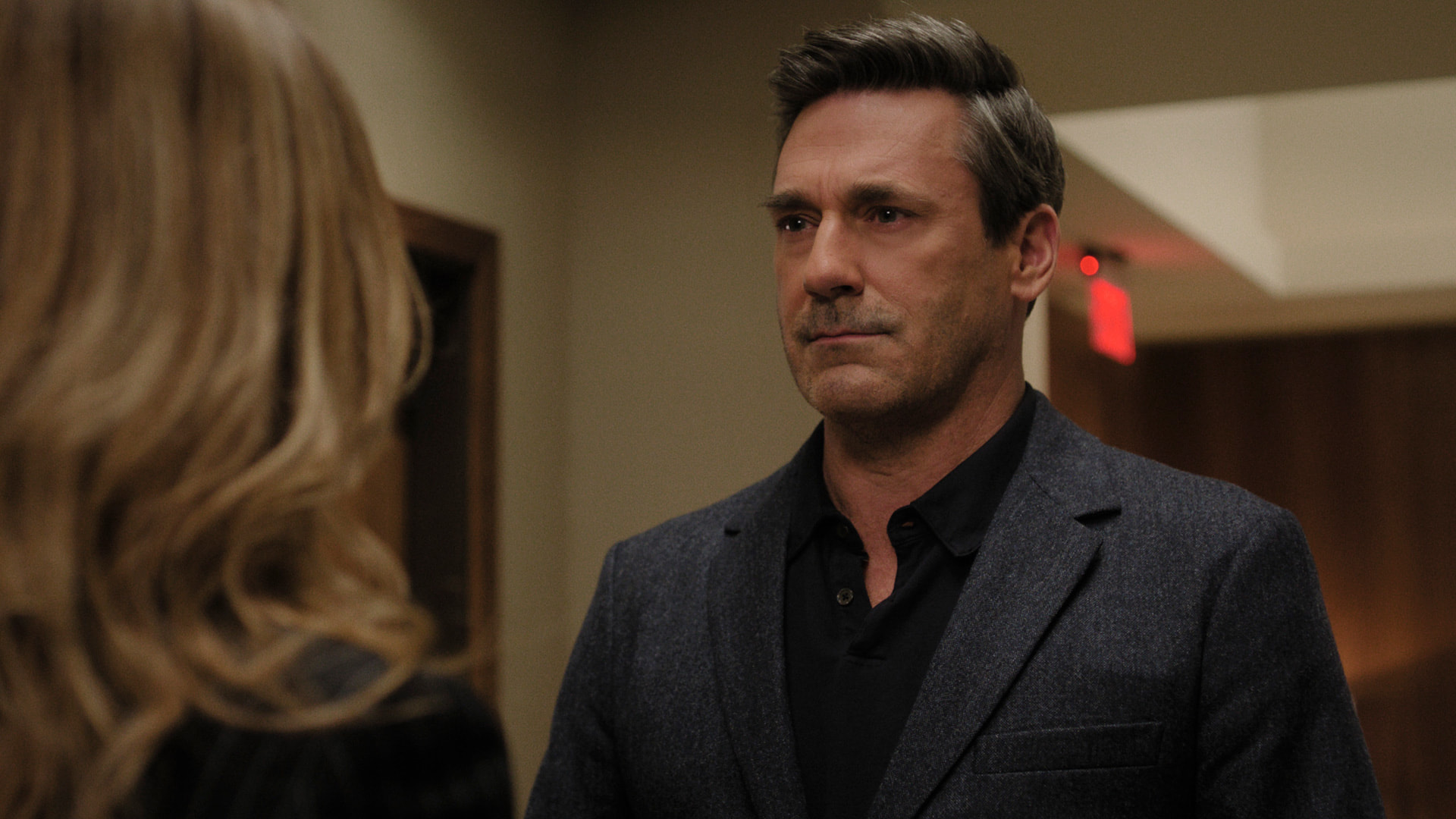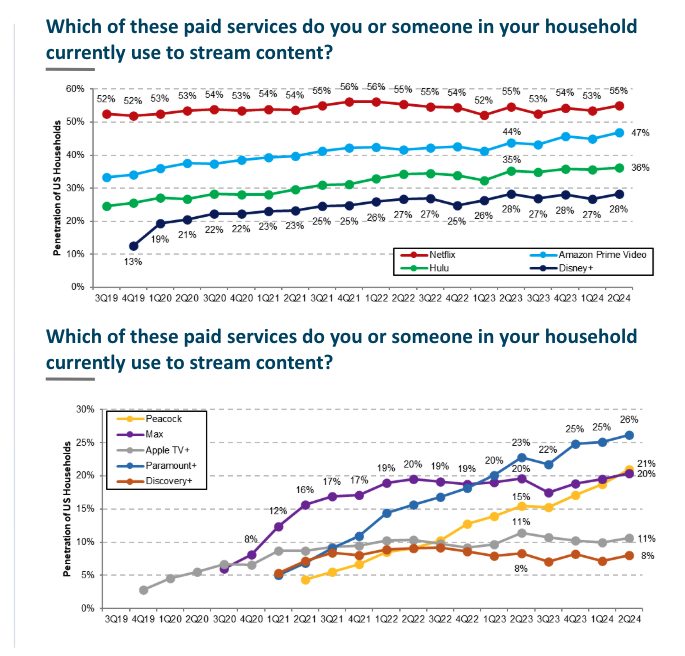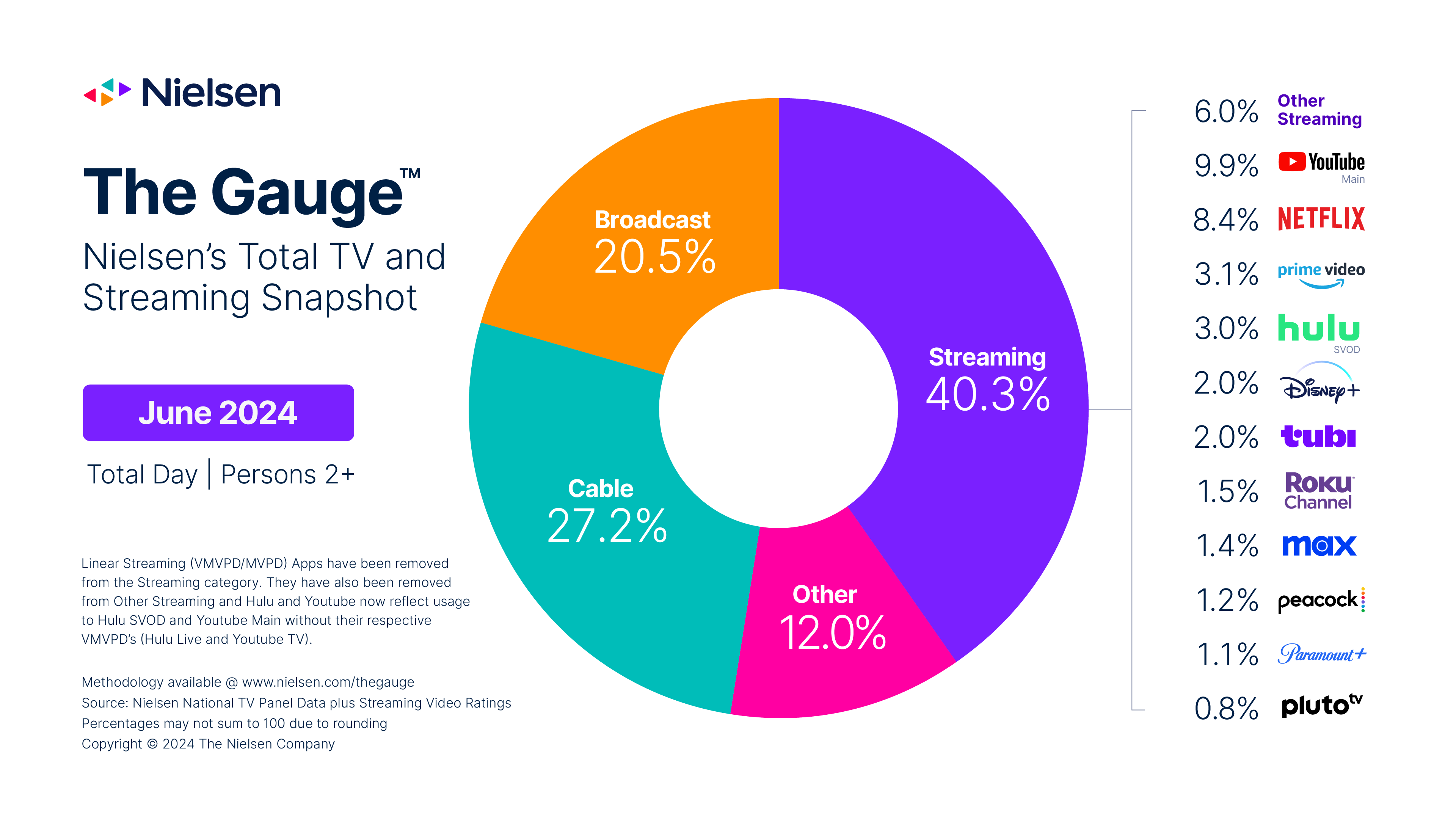
Everybody stand clear — Next TV writers Daniel Frankel and David Bloom are thinking.
DANIEL FRANKEL: Happy Dog Days of Summer, DB. Feels like only six months ago that they were handing out Emmys to a record-low TV audience of just 4.3 million viewers. As it turns out, because of the Hollywood guild strikes, it was only 180 days ago — January. So here we are — Emmy season again. And what a cleanup for FX/Hulu, with Shōgun and The Bear taking 25 and 23 nominations, respectively, and FX getting 93 nods altogether — two more than HBO. Variety editor Cynthia Littleton called it “validation” of Disney’s “high-wire act of producing and commissioning content tailored to audiences around the world.” But I wonder if anyone beyond Variety and Disney/FX/Hulu care about Emmy nominations these days. Me? Twenty years after its landmark debut, my wife and I watched Lost for the first time ever this week. (I know … I know … shameful, especially since we chose instead to get way into The Apprentice back in ’04.) I don't believe this show rose to the level of an excuse to give J.J. Abrams and David Lindelof carte blanche to make two decades of bad TV and movies, some of them involving important franchises. But I can tell four episodes in that Lost, winner of 10 of its own Primetime Emmys, is an achievement for a lost era of broadcast television.
DAVID BLOOM: Who cares about Emmys? Oof. That’s a question only someone no longer part of the Penske Awards Media-Industrial Complex would dare ask, or perhaps even care to ask. Certainly, viewership continues to, er, moderate alongside the broadcast networks that take turns carrying the awards show. Emmy validation does have some value, though, given the vast number of awards handed out, sometimes they feel more like participation trophies than actual markers of artistic achievement. Add in the weirdness of category definitions (why, no, much as I enjoyed the last couple of seasons of The Bear, I don’t remember any scenes that remotely suggested “comedy.” All I remember is family and professional emotional trauma, ruthlessly relived over the years and episodes). But Hulu didn’t want to self-cannibalize its awards contenders, so, by Emmy standards, The Bear is a comedy. I guess the joke’s on us. Hah, hah, giggledy, hah.
It’s worth noting that Apple and Apple TV Plus, the service that supposedly no one watches, snagged 72 nominations, the five-year-old service’s best haul yet. By happenstance, today I interviewed Oliver Schusser, the VP overseeing Apple TV Plus and other major segments of Apple’s nearly $100 billion Services unit. Getting Schusser to enthuse about Apple’s intriguing Major League Baseball and Major League Soccer live sports initiatives was easy enough. Getting him to explain (how) all those Emmys, and all that spending on fine original video programming, are (benefiting) a $3 trillion megacap tech giant? Not so easy. They’re doing it for the fans, I guess. No surprise that Lessons In Chemistry, with an impeccable literary source and a fine lead performance by Brie Larson, did well. Same with Gary Oldham’s prickly perfect performance in Slow Horses, based on the great Mick Herron spy novels. Other particularly worthy shows receiving Emmy attention: the Steve Martin and Girls State documentaries, Physical, Silo, Sugar, The New Look, plus others maybe I haven’t gotten around to.
And then there was The Morning Show, in season 3 and more preposterous by the minute, but stuffed with great guest stars such as my fellow Mizzou alum Jon Hamm as a predatory capitalist/Jennifer Aniston romantic foil. Somehow TMS landed a Best Drama nomination, its first, and more proof that the TV Academy takes a while to notice that a show has long ago pole-vaulted the shark. Will any of these nominations improve signups, viewership and churn rates for Apple TV Plus? Probably not. But as long as Apple is spending those sweet, sweet prestige-chasing programming bucks, Hollywood is delighted to help.
FRANKEL: MoffettNathanson and HarrisX, which do just about as serious of research as you’ll find in the video business with a sample of 8,500 for their quarterly “All Things Streaming” reports, just said this past week that 11% of households watch Apple TV Plus regularly. This service is about to have its fifth birthday on November 1. If it was going to ever be a thing, we would have known about it by now. There's no magic coalescence of a giant unseen audience hiding within Apple’s broader service portfolio, post-Ted Lasso. Maybe the TV Academy thinks its shows are relevant. But all the general streaming public really seems to know about is the long-gone Lasso … and maybe Severance? In summation, I know why Penske hypes awards shows. It’s a good business for him. I'm not sure why Apple invests in its video business.

As I whined to you already, I’m dealing with insurance on two totaled 2012 Toyota Prius-es, as well as a brewing Lemon Law complaint with Hyundai. (The dynamic between the Korean engineers and the U.S. mechanics isn't healthy — think this is going end up in them buying back my Ioniq 5 EV, which I quite liked … until now.)

With all that disruption, talking to lawyers, mechanics and adjusters (some for insurance, some for spines), I haven't been able to dig in fully on our September 10 “Next TV Summit” event in New York. But it's still going be like Woodstock — you’ll trip out nude for our entire four-day “NYC TV Week” event, and tell your grandchildren you were there … and it was the awakening everyone hyped it to be ... or you'll cast your eyes to the ground and concede, “I missed it.” Here's the Next TV Summit agenda.
BLOOM: I'm looking forward to bringing the Next Text experience to the New York live stage with you. Forget Woodstock; everyone who was there is now so old they almost certainly remember nothing about attending. So let’s update to the billion-dollar Taylor Swift Eras tour, minus the hulking NFL tight end stage right. No doubt we’ll stir up some Bad Blood.
I also talked with writer/consultant Matthew Ball on the second anniversary of his book, The Metaverse: And How It Will Change Everything. That change includes the book itself, of which he rewrote 70% and will release a second edition Tuesday, so different it had to get a new ISBN number. The need for such radical rewriting in just two years was forced by the explosion in artificial intelligence and blockchain adoption, but also the arrival of the Apple Vision Pro as what he calls the most or second-most important head-mounted display ever.

What I wanted to talk about, though, is Ball’s recent essay on the real causes of movie-theater declines. He trots out a lot of stats showing the declines started long before the pandemic, and can't be blamed on too many superhero movies, streaming or the other usual suspects. Because the essay is about the movie business, of course a sequel is coming soon. But Part 1 suggests a few experience improvements that I'd love to hear you respond to, given your quaint continued willingness to buy a movie ticket:
• Way fewer trailers. Definitely a waste of time when trailers are routinely released online and rack up hundreds of millions of views. Wading through 25 or 30 minutes of trailers is just another barrier to watching the movie you paid for.
• More “relaxed decorum” screenings, like those with Taylor Swift’s tour movie, which allowed fans to dance in the theater (as we’ll allow during Next Text Live!) and even record bits of the film on their phones. If anything, the shared recordings drove even more viewership.
• Unwind the strategy to rapidly move underperforming theatrical releases to premium VOD. That may salvage some investment, but also trains audiences that they just need to wait two or three weeks to watch a film online they're not so sure about.
FRANKEL: First, I have to get our event producers and the company we work for to read the site and Next Text (happy face emoji goes here). As for Matthew Ball, I interviewed him three years ago for a TV Academy project. Maybe I'm conflating the call with another interview, but I seem to remember him mentioning something about a new kind of green energy.
The Metaverse might not have changed the world yet, but Ball is sort of right about that premium VOD window … but I’m not sure it’s a habit consumers should be trained out of. I've been (one of the few) who were really curious about Kevin Costner’s Horizon, which was yanked from theaters earlier this month, with the first installment in the film series drawing just $28 million in ticket sales after several weeks at the multiplex. I also wanted to see the Tom Hardy film The Bikeriders, which was another box office dud. Tough guy, that Tom Hardy.
I watched both of these flawed yet very engaging cinematic efforts on Amazon premium VOD Friday and Saturday night for 20 bucks each. Maybe it was the Maker’s Mark talkin’, but it was well worth the investment — Horizon is a somewhat convoluted but otherwise solid Western epic that would have thrilled audiences at one time, even as recently as a decade ago, when the thought of sitting still and not dancing to Taylor Swift … and not looking at your phone every two minutes was still an acceptable consumer proposition. And it’s true — I kept delaying a trip to the ol’ Crenshaw Cinemark because I knew that a.) their soda machine mixes Diet Coke to taste like ass, and b.) I knew that movie would be watchable in my living room in a matter of days. Seems to me that whether I was “trained” to go to the theater or not, I still paid $19.99 to see the movie. We all know these films can be streamed now. Cat’s out of the bag. They're going to tell me they can't do it anymore because they’re spoiling me? And I should get my fat ass to the multiplex? Heck, I'd have waited until the Pay 1 window. Speaking of choosing a better user experience for myself, I thought Richard Greenfield’s blog post this week about why Tubi is separating itself from Pluto TV was interesting.
Also read: Paramount’s Pluto TV Stagnates Despite Broader Free Streaming Bonanza
Greenfield believes part of what's driving Tubi's growth is its Netflix-like algorithmic search capabilities that adapt to user taste and become actually useful over time, vs. Pluto's pay TV-like grid approach. This was followed up a Wall Street Journal report suggesting Disney Plus and Hulu UX will become more Netflix-like.
Also read: Disney Plus Planning Netflix-Style UX Updates to Help Improve Engagement
Nielsen's latest monthly domestic viewing market share tracker shows Pluto TV stagnating, as rival FASTs Tubi and Roku Channel — both of which use algorithmic discovery and recommendation — surge.

BLOOM: The tech geek in me desperately wants to believe better, more persistent search and suggestion algorithms matter or all kinds of streaming services. Except with ad-supported free services, better algos really do matter on the bottom line. It's different than with subscription services, or traditional linear, where how much you watch, and how you find things, is kinda someone else’s problem. It’s worth noting the tech geek in David Ellison also believes that better algos mean more money, and not just with Pluto. At my monthly Westside Digital Mix gathering Thursday, I had a long talk with a friend who’s a senior tech executive in a certain about-to-be-acquired historic media company. He didn’t reveal any state secrets, but theoretically speaking, if you have eight separate production operations built up over decades by each of your major film, cable and broadcast units, and you’re merging with a new owner's multiple production units, maybe it’s time to create a new, more streamlined production paradigm. They’ll have a year or so to figure it out. Maybe the change will end up being a bit like this Rick & Morty throwback moment, as dinosaurs discover new powers:
FRANKEL: It’s just another disadvantage certain about-to-be-acquired historic media companies face, going head to head against technology companies. I mean, Disney paid billions of dollars over several stages to acquire BAMTech, and it’s still playing catch-up in regard to search and recommendation. It seems like it’s really hard for the traditional conglomerates to ingest that DNA. Seems easier for Netflix and Amazon to become creative companies … Oh, I want to quickly non sequitur a shoutout to another lost comedy legend, Bob Newhart, who died at 94 last week.
BLOOM: I always think of these things as a matter of corporate DNA. Basically, it’s the thing the company became successful at doing, and for which it has hired staff and built capabilities to do over, in this case, more than a century. The data-driven rigor required of optimized search, suggestion and advertising technologies is a long way from the gut-based calls and human relationship-building of traditional entertainment. Obviously, lots of quants have been absorbed into the Hollywood hive mind over the past couple of decades, but they’re not the ones who get celebrated for their talent relationships and production chops. The relationship dudes (it’s still mostly dudes, Disney heir apparent Dana Walden notwithstanding) are the ones who become head of studio, not the quants in the corner like Jonah Hill’s Pete in Moneyball.
Speaking of soon-to-be-acquired historic studios, this week has seen quite the kerfuffle over Warner Bros. Discovery. The loss of the NBA deal probably becomes final Monday, trimming as much as $600 million in ad and carriage-fee revenues from the bottom line. Analysts have been weighing in. Jessica Reif Ehrlich, the highly respected BofA Securities media analyst, said it was time to give up on the two-year-old WBD experiment. Put Max, the studios and HBO in one bucket, while dumping that $40 billion in debt with CNN and other cable operations in what some delicately called a “shitco.” Then word surfaced that WBD CEO David “The $49 Million Man” Zaslav might be broaching the idea with his keepers. Finally, LightShed’s Greenfield, usually not one to avoid stirring the excrement con gusto, called such an idea “nonsensical.” He’s probably right. Who’s buying a nickel’s worth of shares in CrappyCo? That's an elevator ride to zero. Meanwhile, the good assets, freed of all those impediments, get acquired fast by somebody. Then again, some skeptics similarly dismissed any possibility the Democrats might replace Darkening Brandon with a new light. Now Joe Biden is planning a Rehoboth Beach retirement while Kamala Harris scrambles to line up a VP candidate. So, what's your take on WBD giving up on its grand, and expensive, experiment? Makes me flash on this clever new cover — by the cheeky all-female trio Automatic — of Lou Reed’s New Sensations, with delightful visual references to Sweet Lou, the original 1984 album and his tai chi interest. Maybe it’s time we all experience some new sensations, not just historic movie studios, grumpy heroin-addict geniuses and the body politic.







